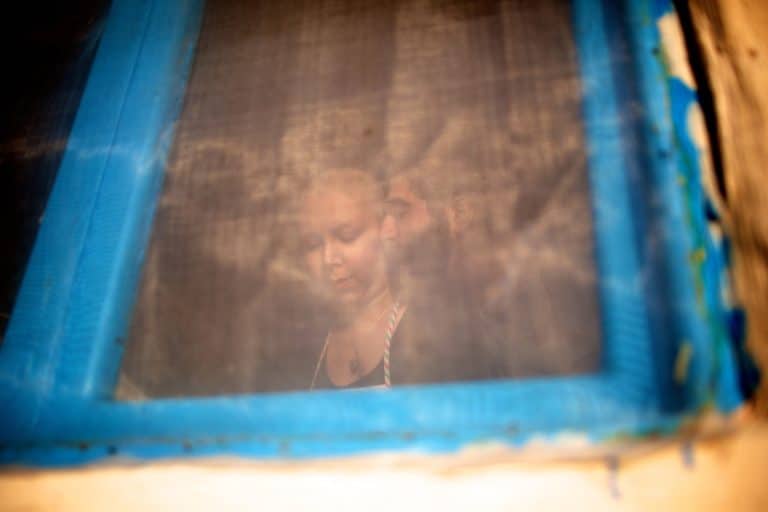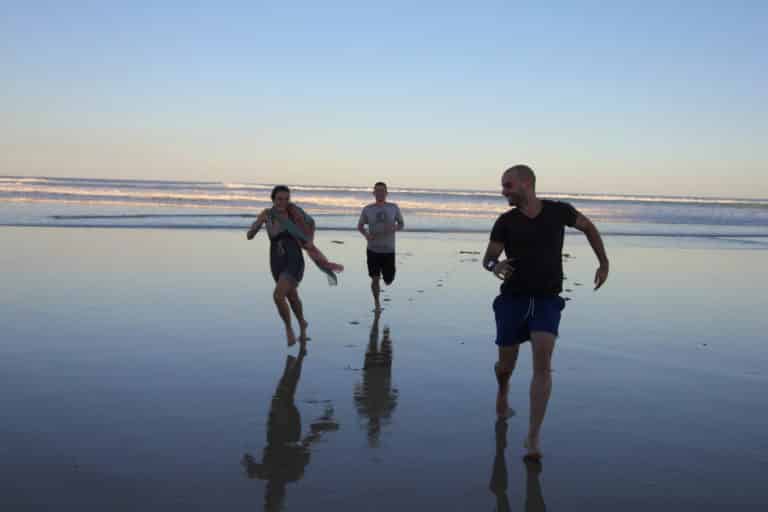
Image by Behrouz Mehri.
Tenderness Follows
As usual, the waiting room is full of people older than me — people grayer, sadder-looking, some with walkers, some in wheelchairs, most with companions. Ever since my last chemotherapy ten years ago, I try to arrive at this office looking less like a patient than a friendly visitor to a world I don’t belong to. I walk in fast, alone. I smile at the receptionist. I plop down on the couch and flip through magazines with a studied nonchalance. It’s prideful, this not wanting to be counted among the sick, but to anyone who’s spent half a year of her life with no hair, understandable.
The receptionist hands me a clipboard with a “Review of Symptoms” form. It’s a piece of paper that used to leave me with heart palpitations. Circling even a single YES to one of the 50 suspicious symptoms could mean the beginning of the end of my life. Today I skim it without thinking. I check NO to rectal bleeding, blurred vision, tremors, boils, black stool, excessive thirst, urine retention, wheezing, seizures, persistent itch.
Ten years of symptom-less living is a get-out-of-jail pass at this office, so today, my final check-up, should be a day of elation or at least relief. Instead I feel no more emotion than I do going to the dry cleaners. I had considered taking a celebratory selfie in front of the building. A selfie of me giving the finger to the Rose Cancer Center. But the sun was too bright and I didn’t feel vengeful or victorious. I just felt hurried.

I get my blood drawn in the chilled lab room. I consider that lab technicians must be hired on the basis of their ability to converse cheerfully while poking strangers with needles. I’m glad, though: the needle inserted under the thin skin of the back of my hand really is unpleasant, and her chatter about what she’s making for dinner distracts me.
The check-up with Cindy, my favorite physician assistant, is also breezy and genial, just like our conversations when we see each other at the grocery store. Over the years she’s cultivated a friendliness that’s as valuable a tool as the stethoscope draped around her neck. Friendliness says everything is normal. You are not a sick person anymore.
She listens to my lungs and asks about my kids. I ask about hers as she presses her fingers into my abdomen looking for tumors. She feels my armpits, less sweaty than on previous visits, and fills me in on the latest breast cancer research. I listen with mild interest. For the last five years, most of the research has been irrelevant to me. I don’t even have questions for her anymore, except my annual one about how much alcohol it’s okay to drink. Depending on how I phrase the question, I can usually get the answer I want, and today I score again.

Then she helps me off the examination bed, an unnecessary kindness. Of course, I’m still in a hospital gown, the costume of sick people everywhere. I suppose such gestures are protocol.
Now it’s time to say goodbye. She hugs me. It’s a warm hug, not a quick, superficial one. All the sudden, my chest pressed against hers, her arms patting my back, I realize what I’ve avoided thinking about all day. It’s over. Over. I am released, graduated, discharged, acquitted.
Things must be felt, must be said. It’s people like you, she’s telling me, but I don’t hear her finish. It’s as if my ears, too, are clogged with tears.
I wasn’t expecting this. The last time I cried over cancer was when I had to tell my husband about the call from the radiologist.
It’s not just that it’s over. I’m flooded with gratitude, gratitude for her goodness and her kind care these past ten years, her clear explanations of my risks and my options, her reassurances to my anxieties. Doctors came and went, but Cindy has been with me since my first visit to this office, a steady presence. She knows my history. She knew my old body, and now my new body, like no one else ever will.
I thank her for being my rock. My voice catches in a way I despise, cracking like a weepy bridesmaid toasting the bride. I don’t say all I’m feeling.
We’ll see each other in the grocery store, we say. Goodbye, goodbye.
I get dressed. Goodbye room. Goodbye gloom. Goodbye cold lab room. Goodbye syringes, goodbye needles, goodbye green rubber arm bands. Goodbye hallway that ends in the chemo wing that I try not to look down. Goodbye cheerful flower pictures. Goodbye mauve wallpaper. Goodbye billing desk. Goodbye appointment cards.

The curly-haired clerk asks me when the doctor wants to see me again. I grin. “Never!” I say. At least that’s the plan, I add, not wanting to jinx myself. I wait for her to congratulate me. Instead she sighs. I hope I get there someday, she says. It’s just been one year for me.
She’s on the healthy side of the desk and I’m on the sick side, but she’s closer to cancer than I am. I know what’s ahead for her — the headaches that are really brain tumors, the backaches that are cancer cells in the spine, the phlegmy cough that signals metastasis in the lungs, the nine years of anxiety flare-ups that a mere hemorrhoid can provoke.
I wish she didn’t have to go through it. I wish I knew her well enough to take her curly head in my hands and tell her how far she’s come already, how beautiful she is, how much stronger she is than she knows. Instead I mumble reassurance, not so proud anymore of my health.
On my way out of the building I share the elevator with two people in wheelchairs: one, a frail-looking elderly white man, the other a young overweight African-American man. They are laughing together. They had just sat next to each other for their chemo infusions. Their laughter is so genuine; I wish for a moment — less than a second, really — that I had sat with them to share the joke. I want tell them that I’m one of them, one of the ones who knows what they know. I smile, but they don’t notice me.

I walk into the sunshine and my heart begins to expand till I feel like I’m floating. I feel tender towards the nurse on break with her water bottle, tender towards the old woman being helped out of her car, the man not looking before he steps into the crosswalk. I want to take these people ever so gently in my arms and say, It’s people like you.
I let this mood wash over me like a sunbath. It’s familiar. I remember such moods from my first year post-treatment. I re-entered the healthy world and found it a marvel. I was alive. My hair grew back curly. Winter was snowy, spring was even more beautiful. The people who had been kind when I was sick were beautiful. So were the ones who weren’t. Any suffering I had undergone was nothing compared to what others went through. It was one of the happiest years of my life.
Everyone suffers, silently or obviously, one way or the other. Once you see that connection, tenderness follows.
I take a selfie after all, a smiling one. Goodbye to cancer. Mostly.

